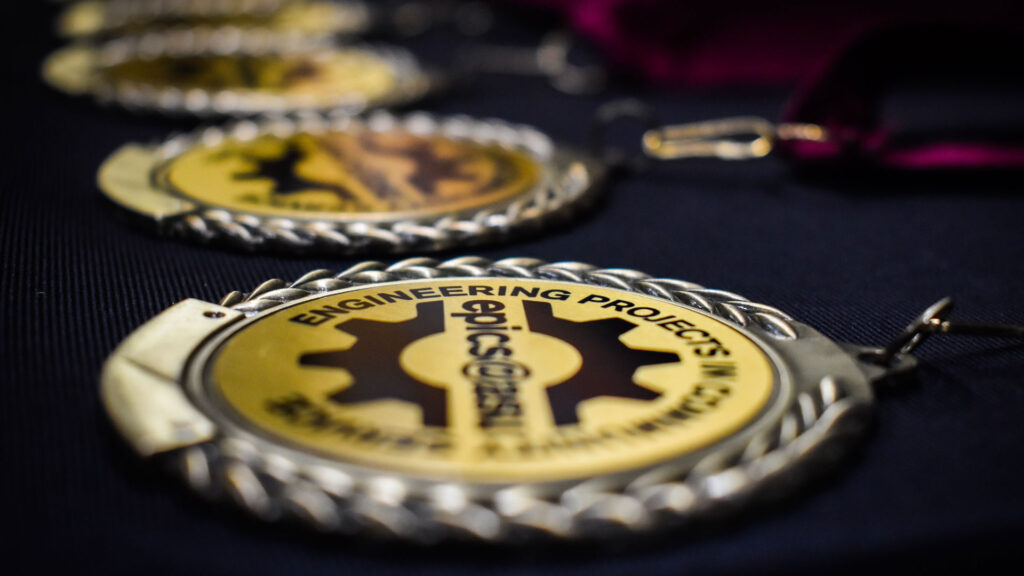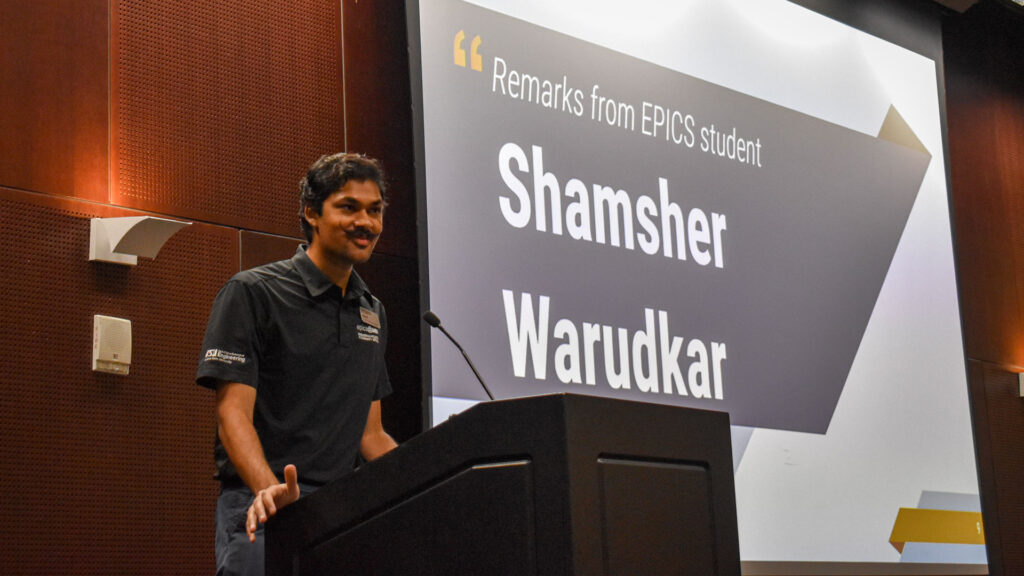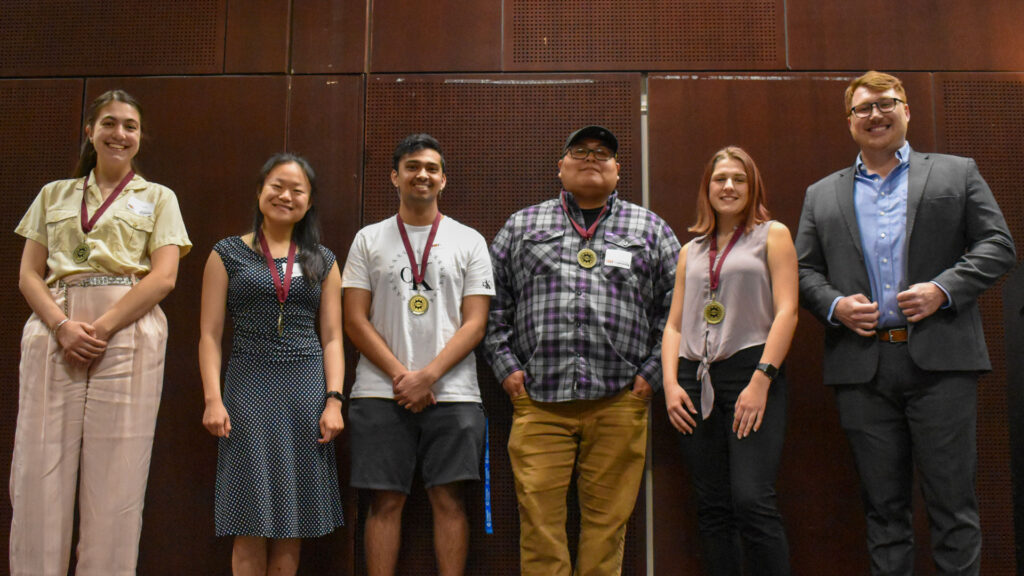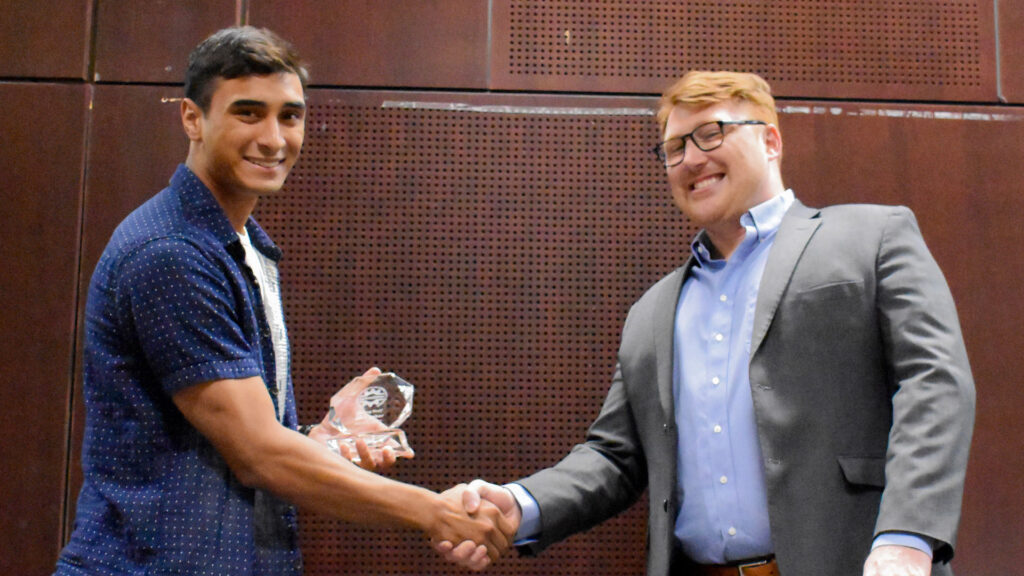Students and community partners celebrated at 2022 EPICS Generator Awards

At the end of each academic year, the Engineering Projects in Community Service, or EPICS, program at Arizona State University hosts a Generator Awards ceremony to recognize Ira A. Fulton Schools of Engineering students, faculty members, industry mentors and community partners and celebrate the success of the EPICS teams.
EPICS is a national, award-winning, social entrepreneurship program. Approximately 400 students in the Fulton Schools participate each semester in more than 55 EPICS projects.
Student teams work together to design, build and deploy systems to solve engineering-based problems for charities, schools and other not-for-profit organizations. Currently, EPICS@ASU is working with more than 45 community partners on projects that span across four different themes: community development, education, health and sustainability. The teams receive funding through grants and corporate donors such as W. L. Gore & Associates, Inc. and EPICS in the Institute of Electrical and Electronics Engineers, or EPICS in IEEE, to bring their ideas to life.
For the 20201–2022 academic year, three EPICS teams were recognized along with eight individual student awardees in different categories. Additionally, two industry mentors, two community partners and an outstanding community leader were recognized for their contributions to ASU’s EPICS program.
Shami Warudkar, a Fulton Schools graduating senior and longtime EPICS participant, gave the keynote address during the EPICS Generator Awards ceremony. He spoke about his own EPICS journey and how it has helped prepare him for his future after ASU.
“The EPICS program enabled me to leverage the resources of the university to make a real impact on an impoverished community on the other side of the world,” Wardukar said at the event. “EPICS is perhaps the best way for engineering students to make real change happen, and I’m incredibly grateful for the opportunities it gave me.”

Recognizing epic teams
The Catalyst Award is given to a team that has progressed exponentially in their design and implementation process in the given year. This year’s award was given to the Vietnam Sustainable Shrimp Farming team.
“This team has accomplished a great amount in just two semesters and if this trajectory continues, the team will be presenting a minimally viable product to its community partner in Vietnam this August,” says Jared Schoepf, EPICS@ASU program director.
“If this product is successfully implemented, it could help curb the huge environmental impact that shrimp farming has on the Mekong River Delta,” Schoepf says. “By mitigating the misuse of water resources through data-informed water health diagnostics, this product will be instrumental in promoting the longevity of precious water resources that support families and livelihoods for impoverished people worldwide.”

The Innovation Award is given to the team that has developed an innovative solution to their project. Innovative solutions are solutions that work to foster creative design and ingenuity while meeting the needs of the client. This year’s award was given to the Lake Litter Solutions team.
Lake Litter Solutions put in long hours to make sure to meet the needs of their community partner despite facing many obstacles and challenges. Each member of the team brought a diverse set of skills and experiences to the table, thus making it possible for them to transform the EPICS class into a grant-funded internship opportunity through the EPICS in IEEE program.
The Impact Award is given to the group that possesses the potential for significant impact on a local or global community and has shown a meaningful understanding of the population they are serving. This year’s award was given to the Project Koyash team, who also won first place in the EPICS Elite Pitch Competition.
This team of students partnered with the Taiwan Fund for Children and Families to provide air filters for nomadic communities in Mongolia. Due to climate change and drought, major food sources have been diminished for these communities in Mongolia which has forced them to relocate to the overpopulated city of Ulaanbaatar.
The team’s goal is to filter air within the homes of these nomadic communities so that it is safe for them to breathe. They have sent one prototype to their community partner to collect data in a pilot test. The team is now testing their second prototype, which is completely autonomous, and will use their new funding to create 12 filters to send to Ulaanbaatar.
Recognizing community involvement
In addition to recognizing students, the EPICS Generator Awards also acknowledge community partners and mentors who help the students reach their goals.
The Community Catalyst Award recognizes a community partner that displays an exceptional level of involvement and goes above and beyond to support their EPICS project and student team. This year’s award winners were Dr. Julianna Diddle, MD, and Peter Fischer.
Diddle is the community partner for the Queue + team. Her students described her as a supportive leader who makes room in her busy schedule to meet with them while always bringing a joyful and enthusiastic attitude.
“Dr. Julianna Diddle has met countless times over Zoom and in-person and is a very unique and key character that motivates the whole team to work twice as hard,” says Rishik Kolli, an EPICS student participant. “She is great at communicating her needs for the project, and is super kind and friendly.”
Fischer is the community partner for the 3D Printed ASU Tactile Maps and Audible ASU Maps for Wayfinding teams. EPICS students described him as someone who has fostered additional relationships with other community members, stakeholders and experts to provide coaching and mentorship for his teams.
“Peter Fischer has been involved with the EPICS program for over a year and has gone above and beyond to support teams and expanded the EPICS program’s impact on inclusivity,” Schoepf says. “He has been a key asset to the program, aiding students’ understanding of user needs and how to conduct customer discovery interviews.”
The Navigator Award is given to the academic associate who consistently provides guidance, mentorship and support to teams while helping them to challenge assumptions, pivot when necessary and arrive at innovative solutions. This year’s two awardees were Anna Kruse and Doug Toy.
“Anna Kruse is a helpful and engaged undergraduate teaching assistant,” says Lill Offenberger, an EPICS student participant. “She is dedicated to giving constructive feedback that will enhance the reader’s knowledge of the project as well as giving the team a chance to showcase their hard work.”
Jessica Maschino, an EPICS student participant, says of the second awardee: “Doug Toy takes time outside of the scheduled classes to read our documents and provide valuable feedback. He is excited to work with students and is always ready to provide his insight on the unique challenges his student teams may be facing. He encourages students to apply for funding and is prepared to help get them past any roadblocks they may encounter.”
This year a special award was presented to past EPICS@ASU director, Joshua Loughman, for his outstanding leadership. Joshua served as an EPICS director for five years, overseeing all aspects of the program including teaching multiple sections of the EPICS courses and developing relationships with not-for-profit agencies, industry mentors and partners to support the EPICS program and developed the Global EPICS program.
Throughout his five years with EPICS, Loughman contributed so much to EPICS and served as a mentor for hundreds of teams and thousands of students. He brought incredible leadership and expertise to the EPICS program, developing it to what it is today.
Recognizing individuals

The Rising Star Award goes to a promising, new EPICS student in their first or second semester in the program who has made significant contributions to their team and brought enthusiasm, passion and dedication to the EPICS program. This year’s Rising Stars were John Baker from the Headcount team, Dakota Edwards from the Lake Litter Solutions team and Carol Lu from the Vietnam Sustainable Shrimp Farming team.
Another award given to students is the Outstanding Team Leader Award. This award is given to a team leader that goes above and beyond for their team while remaining organized, motivating and forward-thinking. The students who were recognized as Outstanding Team Leaders were Lilli Offenberger from the Rewired Bionics team, Luke Macy from the Foster AZ team and Rishik Kolli from the Queue+ team.
The last student award is the Student Impact Award which is given to students who display an exceptional level of commitment to their project and go above and beyond to help their team make progress and achieve their goals. This year, Jessica Maschino from the Lake Litter Solutions team and Carlos Moran-Esparza from the Vietnam Sustainable Shrimp Farming team were recognized for their impact on their respective teams.